 W
WCatalan, known in the Valencian Community and Carche as Valencian, is a Western Romance language derived from Vulgar Latin. It is the official language of Andorra, and a co-official language of three autonomous communities in eastern Spain: Catalonia, the Valencian Community, and the Balearic Islands. It also has semi-official status in the Italian comune of Alghero. It is also spoken in the Pyrénées-Orientales department of France and in two further areas in eastern Spain: the eastern strip of Aragon and the Carche area in the Region of Murcia. The Catalan-speaking territories are often called the Països Catalans or "Catalan Countries".
 W
WThe Reial Acadèmia de Bones Lletres de Barcelona is a Catalan literary society, based in Barcelona. It was founded in 1729 and it has its headquarters since 1902 in the Palau Requesens in Barcelona's Gothic Quarter.
 W
WThe Book of the Consulate of the Sea or Book of the Consulate of Sea is a compendium of maritime law that governed trade in the Mediterranean for centuries. Of Catalan origin, it was translated into many languages and served as the basis for current international maritime law.
 W
WThe Catalan dialects feature a relative uniformity, especially when compared to other Romance languages; both in terms of vocabulary, semantics, syntax, morphology, and phonology. Mutual intelligibility between its dialects is very high, estimates ranging from 90% to 95%. The only exception is the isolated idiosyncratic Alguerese dialect.
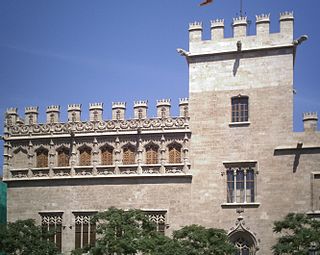 W
WThe Consulate of the Sea was a quasi-judicial body set up in the Crown of Aragon, later to spread throughout the Mediterranean basin, to administer maritime and commercial law. The term may also refer to a celebrated collection of maritime customs and ordinances in Catalan language, also known in English as The Customs of the Sea, compiled over the 14th and 15th centuries and published at Valencia in or before 1494.
 W
WThe Diccionari etimològic i complementari de la llengua catalana is an etymological dictionary of Catalan compiled by Joan Corominas with cooperation of Joseph Gulsoy and Max Cahner.
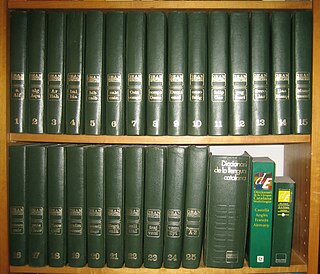 W
WThe Gran Enciclopèdia Catalana is a Catalan-language encyclopedia, started in fascicles, and published in 1968 by Edicions 62. The soul of the work was written by Max Cahner, and the first director was Jordi Carbonell. From the second volume the work had its own publisher: Enciclopedia Catalana SA with Jordi Pujol, and the new director was Joan Carreras i Martí.
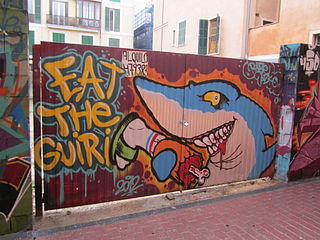 W
WGuiri is a colloquial Spanish slur used in Spain applied to foreign tourists, particularly from Great Britain, but can be applied to other Northern European countries.
 W
WThe Catalan language originated from Vulgar Latin in the Pyrenees Mountains between France and Spain. It diverged from the other Romance languages in the 9th century. At that time, Catalan spread quickly throughout the Iberian peninsula when the Catalan counts conquered Muslim territory. By the 11th century, the Catalan language was present in several feudal documents. Catalan was present throughout the Mediterranean by the 15th century. At that time, the city of Valencia was thriving.
 W
WIbero-America or Iberian America is a region in the Americas comprising countries or territories where Spanish or Portuguese are predominant languages. Portugal and Spain are themselves included in some definitions, such as that of the Ibero-American Summit and the Organization of Ibero-American States. The Organization of Ibero-American States also includes Spanish-speaking Equatorial Guinea, in Central Africa, but not the Portuguese-speaking African countries.
 W
WThe Interuniversity Institute of Valencian Philology, was created in 1987, and took form with a decree of the Generalitat Valenciana that was issued in 1994. It is composed by the University of Valencia, the University of Alicante and the University Jaume I, from Castellón de la Plana, i.e., the three Valencian universities with superior philology studies.
 W
WThe inverted question mark, ¿, and inverted exclamation mark, ¡, are punctuation marks used to begin interrogative and exclamatory sentences or clauses in Spanish and some languages which have cultural ties with Spain, such as the Galician, Asturian and Waray languages. The initial marks are mirrored at the end of the sentence or clause by the 'ordinary' question mark, ?, or exclamation mark, !.
 W
WFrance has one official language, the French language. The French government does not regulate the choice of language in publications by individuals, but the use of French is required by law in commercial and workplace communications. In addition to mandating the use of French in the territory of the Republic, the French government tries to promote French in the European Union and globally through institutions such as La Francophonie. The perceived threat from Anglicisation has prompted efforts to safeguard the position of the French language in France.
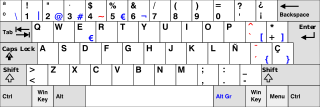 W
WThere are four languages with official status in Catalonia : Catalan; Spanish- which is official throughout Spain; Aranese, a dialect of Occitan spoken in the Aran Valley; and Catalan Sign Language. Many other languages are spoken in Catalonia as a result of recent immigration from all over the world.
 W
WThe Latin Union was an international organization of nations that used Romance languages that existed as a functional institution from 1983 to 2012. Headquartered in Paris, France, its aim was to protect, project, and promote the common cultural heritage of Romance peoples and unifying identities of the Romance, and Romance-influenced, world. It was created in 1954 in Madrid, Spain, and its membership rose from 12 to 36 states, including countries in North America, South America, Northern Europe, Southern Europe, Africa, and the Asia-Pacific region.
 W
WRamon Llull was a Spanish philosopher, theologian, poet, missionary, and Christian apologist from the Kingdom of Majorca.
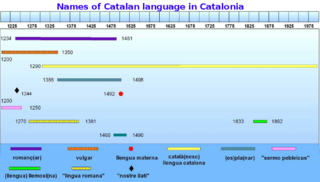 W
WThe first names, or glossonyms, of the Catalan/Valencian language formed in a dialectal relation with Latin, in which Catalan existed as a variety. These names already expressed the relationship between the two languages. New names that related Catalan to Rome came about to dignify the Catalan language in the thirteenth century, though Latinists called it vulgar and the people planus, or pla.
 W
WNormes de Castelló, also known as Normes del 32, are elementary orthographic guidelines that follow Pompeu Fabra's Catalan language norms for its Valencian variety. They were signed in 1932 in Castelló de la Plana by the most relevant cultural institutions of the Valencian Community.
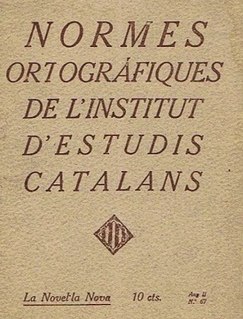 W
WThe Normes ortogràfiques are a list of 24 rules which were promulgated by the Institut d’Estudis Catalans on January 24, 1913, with the purpose of regularizing Catalan spelling. They were born out of the necessity to establish a graphic codification for the Catalan language, which at the moment did not have a unitary spelling.
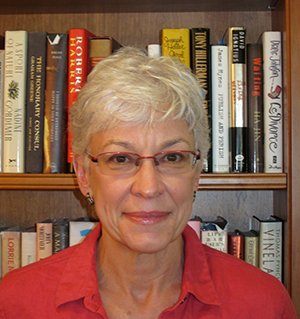 W
WKathryn Ann Woolard is a Professor of Anthropology at the University of California, San Diego. She specializes in linguistic anthropology and received a Ph.D. in anthropology from the University of California at Berkeley.
 W
W